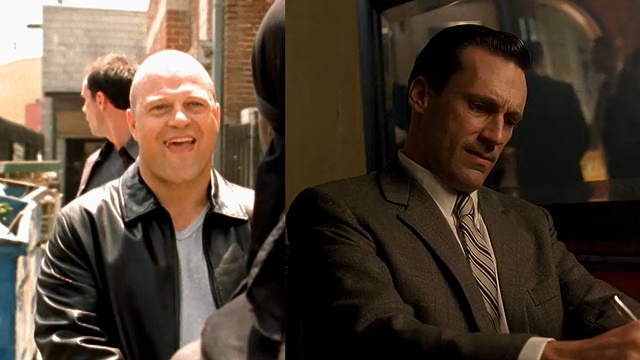VAGUE SPOILERS FOR MAD MEN AND THE SHIELD
Vic Mackey and Don Draper are not that different. Both are skilled professionals in a middle management position – powerful enough to lead a small team, junior enough to have to report to higher-ups, highly respected by those both above and below them. Both work to build the facade of a loving all-American family but blithely cheat on their wives. Both are paragons of masculinity that reveal a toxic inner core that threatens to destroy themselves and everyone around them. Both own the shit out of everything enough to attract viewers that will overlook their toxicity. What separates the two, even more than the fact that Vic is a violent murderer and Don isn’t, is that Vic is in a drama and Don is in literature.
Vic’s story begins with his world out of equilibrium. He’s a cop who commits crime, and he’s a loving husband and father who cheats on his wife and takes care of a prostitute. The story is pushed on via cause-and-effect; at the centre of his life, committing crime as a cop means the Feds are now after him, and the only possible way for him to continue the life to which he’s become accustomed is to kill the innocent cop sent after him. The consequences for his contradictory decisions all bounce off each other; his home life is changed by his criminal activities, his cop life affected by his home life. The process of cause-and-effect slowly resolves each contradiction, until at the end Vic is finally left in perfect balance, one action that does not contradict itself.
Don’s story also begins out of equilibrium, but it actually resolves itself much quicker. His actions aren’t connected by cause-and-effect, but by harmony-and-contrast. He shows us an action, then he shows us a completely different action, then he shows us a third action explaining the contradiction. This means his story, unlike Vic’s, doesn’t need to be linear – sometimes seeing an explanation requires jumping back very far in time (it’s possible that jumping forward could create a compelling sense of contradiction, but the show never tries that). It also means that more spectacular means are required to create contrast, best shown when it burns down the entire world in the season three finale and takes an entire season to rebuild one from scratch. Don also ends his show in perfect balance and down to a single action, because every moment of contrast has been balanced out.
What I take from this is that a compelling protagonist is someone whose life is out of equilibrium; someone whose choices violently contradict each other, and yet plausibly come from the same person.
What’s interesting about both stories is how they’re two sides of the same coin, philosophically, in that Mad Men shows the buildup to a decision and The Shield shows the consequences of one. Don and Vic are both professionals at their jobs, and even have superficial similarities in their positions, but Don is defined by being ill-at-ease with his work (as seen, for example, when he imagines what his dead father would say to him about it) while Vic’s career is one of the primary ways he defines himself.
Mad Men ends with Don completely at ease for the first time, with no obligations, no expectations, no identity to live up to beyond what he chooses, and his final action of the series is him choosing what makes him happy with a full clarity of vision and without a shred of guilt or remorse. The Shield ends when there’s nothing more that could possibly happen as a result of Vic’s original decisions; his final action is to process the events of the series before appearing to make a new decision. We know where Don’s going at the end of the series; we can only guess Vic’s destination.
What Mad Men shows us is the process of decision-making, an act of refinement and theorising and researching and testing, and the anxiety that will weigh down someone who refuses to commit to a decision. What The Shield shows us is the process of having made decisions, of impacting the world and feeling that impact, and the anxiety that will weigh down someone who refuses to accept the consequences for their actions. They’re two halves of the human experience.


